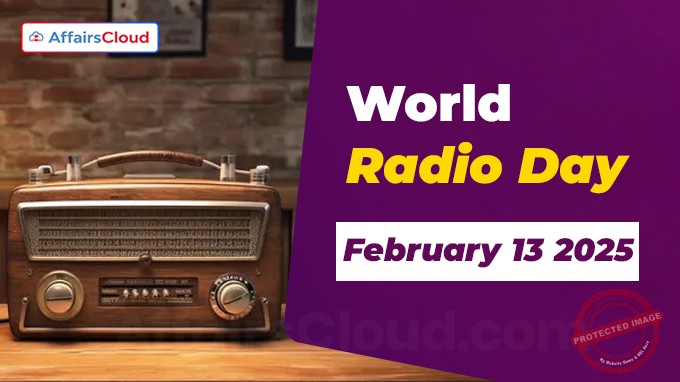 The United Nations (UN’s) World Radio Day (WRD) is observed annually on February 13 across the globe to honor radio’s enduring influence as a powerful and accessible medium for communication, education, and entertainment.
The United Nations (UN’s) World Radio Day (WRD) is observed annually on February 13 across the globe to honor radio’s enduring influence as a powerful and accessible medium for communication, education, and entertainment.
- 13 February 2025 marks the observance of the 14th WRD.
- The theme for WRD 2025 is “Radio and Climate Change”, highlighting radio’s vital role in disseminating information about climate change, amplifying environmental advocacy, and promoting sustainable practices.
Background:
i.In 2011, the Member States of the United Nations Educational, Scientific and Cultural Organization (UNESCO) adopted a resolution during its 36th General Conference, proclaiming February 13th as WRD to commemorate the establishment of UN Radio(UNR) in 1946.
- This resolution followed a proposal by the Spanish Radio Academy, Spain in 2010.
ii.In 2012, the United Nations General Assembly (UNGA) adopted the resolution A/RES/67/124 and endorsed UNESCO’s resolution, formalizing WRD.
- The first-ever WRD was observed on February 13, 2012.
Note:UNESCO serves as the Chair of the informal International World Radio Day Committee.
Why February 13?
i.February 13 marks the anniversary of the establishment of the UNR Service in 1946.
ii.The proposal to observe WRD on February 13 was made by Julian Huxley, the first Director-General (DG) of UNESCO (1946-1948).
About UN Radio (UNR):
i.Initially, UNR’s programs were broadcast in the 5 official languages of the UNs: English, French, Chinese, Russian, and Spanish. Arabic was later added to accommodate a broader audience.
ii.By 1950, UNR expanded its reach to 33 languages, reflecting its commitment to global communication.
iv.In 1980, UN peacekeeping missions began launching their own radio stations to provide localized information and support peacebuilding efforts.
v.In 2017, UNR merged with the UN News Centre to form UN News, which continues to produce daily news and multimedia content in multiple languages, including Arabic, Chinese, English, French, Swahili, Portuguese, Russian, Spanish, and Hindi.
Note: The UN Audiovisual Library presents UN Radio Classics which is an online archive of documentary and dramatic programmes.
About Radio:
i.Radio, a medium for transmitting audio signals via electromagnetic (EM) waves, was first demonstrated by Heinrich Hertz in 1886.
ii.Guglielmo Marconi later developed the first practical radio communication system, achieving transatlantic transmission in 1901.
- The first voice and music signals were broadcast in December 1906 by Reginald Fessenden.
iii.In 1920, the first commercial radio broadcast occurred in Pittsburgh, Pennsylvania, the United States of America (USA).
2025 UNESCO Observances:
As part of the WRD 2025 celebrations, UNESCO organized a forum titled “Radio and Climate Change” to underscore radio’s pivotal role in addressing climate-related issues.
- This forum featured a series of events and discussions aimed at enhancing the quality and diversity of information sources in climate reporting.
Key Facts:
i.In the 1860s, Scottish scientist James Clerk Maxwell predicted the existence of radio waves.
ii.India’s first radio broadcast was conducted in June 1923 by the Radio Club of Bombay (now The Bombay Presidency Radio Club Limited) in Mumbai, Maharashtra.
iii.The inaugural news bulletin of All India Radio (AIR) was aired on January 19, 1936.Initially known as Akashvani, India’s first radio station was later renamed to All India Radio in 1957.
iv.AIR is one of the largest radio broadcasters globally, operating over 415 stations in around 23 languages and 146 dialects.It provides coverage to 99% of the population and features 18 Frequency Modulation (FM) channels.
Note: The World Television Day is celebrated annually on November 21 across the globe.




